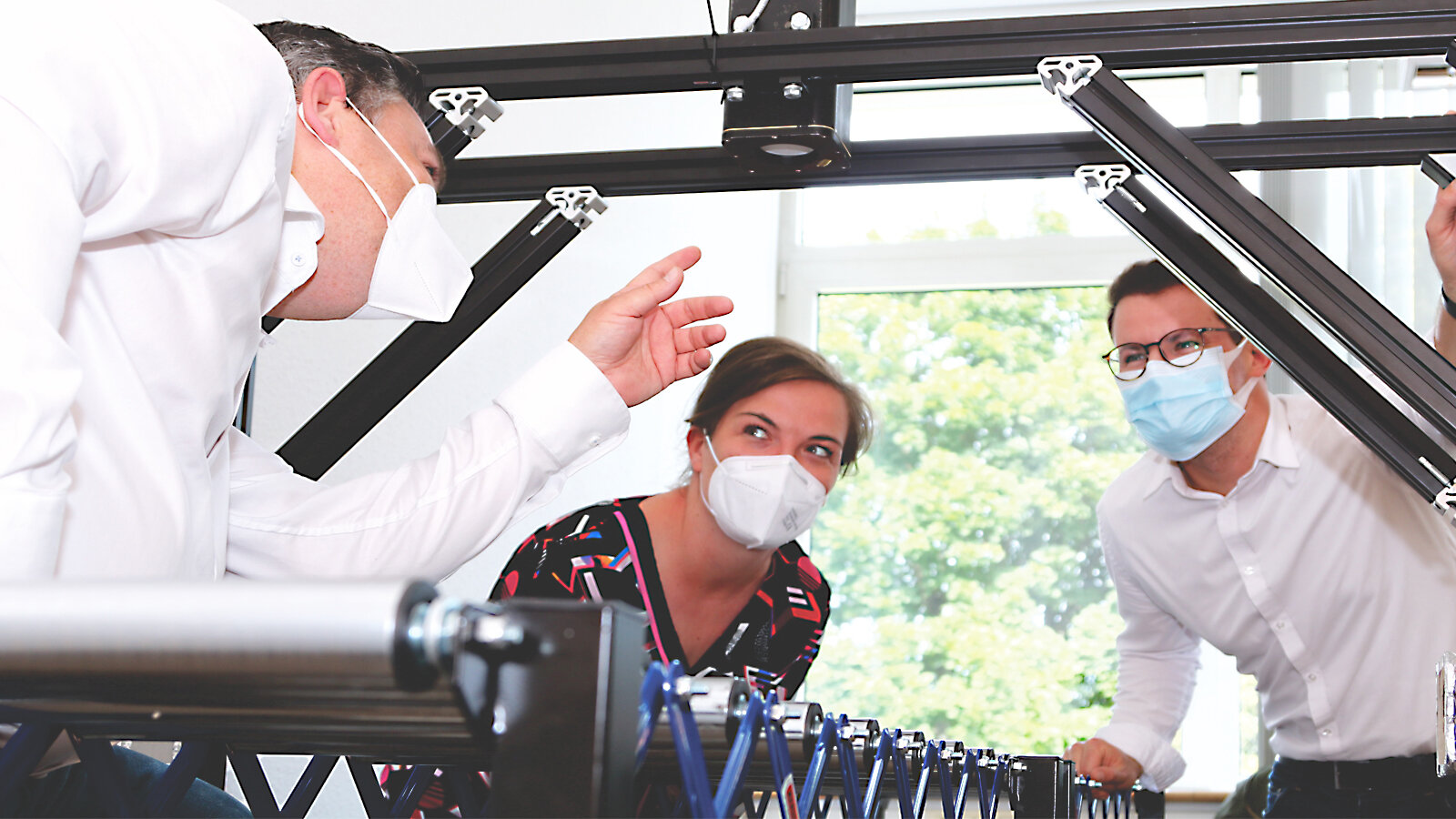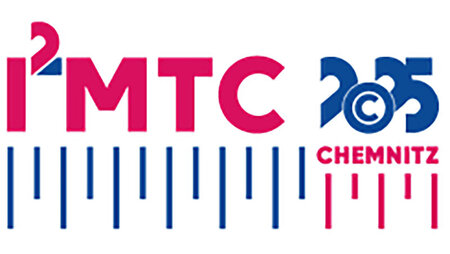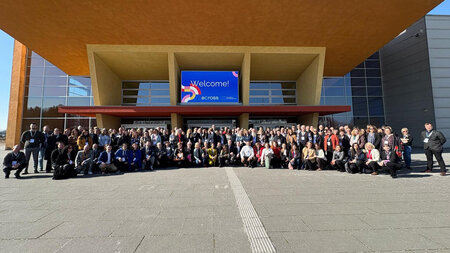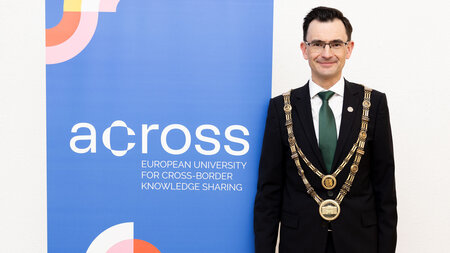TUClab-Funded Start-Up Successful in Product Development for the Steel Industry
University spin-off and one of the 2019 TUClab winners – mecorad is making steel production more digital and sustainable today
-

Dr. Marc Banaszak (l.), mecorad founder and managing director, uses the demonstrator to explain a radar sensor for measuring the thickness of hot steel slabs to Dr. Susanne Schübel, managing director of the SAXEED start-up network, and Dr. Joseph Heß, TUClab project manager at Chemnitz University of Technology. Photo: mecorad GmbH
In September 2019, just one year after its official founding, the start-up mecorad won the TUClab competition at Chemnitz University of Technology as one of three successful teams. The goal of mecorad was and is to develop solutions for the steel and metal industry in order to achieve high product quality while using as few resources as possible. The spin-off from Chemnitz University of Technology received start-up funding and start-up support from TUClab as well as SAXEED in addition to equity financing.
Two years later, Dr. Joseph Heß, project manager of TUClab, and Dr. Susanne Schübel, managing director of the SAXEED start-up network, met with mecorad founder and managing director Dr. Marc Banaszak at the Technologie Centrum Chemnitz (TCC) to learn about current projects and the company’s development. Things got heated - as Marc Banaszak's team presented a new demonstrator that can measure precisely even under extreme heat and thus be used in steel production.
"In mid-2020, we were in the midst of the Corona pandemic, and accordingly, it was difficult for most of the young companies and startups we work with as part of TUClabs to establish themselves in the market. It is therefore all the more gratifying to see how the company mecorad, which we promoted and supported, has continued to develop despite this difficult period and even after the support it received from us and the SAXEED startup network," says Heß. For example, the order books are now filling up again and the demonstrator presented shows that mecorad is ready to make an important contribution to the digitization of the steel industry. "After the visit, I am very convinced that the company has everything it needs to do this," adds Heß.
More sustainability in steel and hot rolling mills thanks to high-precision measuring instruments
In 2018, the interdisciplinary team from mecorad set out with the idea of helping operators of steel and hot rolling mills improve their processes with high-precision measurement solutions and applications based on them. In addition, they wanted to support the companies in networking their production all the way to the end customer. The need was and is there, because both the reduction of CO2 emissions in these energy-intensive industries and digitization are currently among the greatest challenges for the steel and metal industry.
Today - three years later - mecorad can demonstrate high-precision measurement solutions that lead to higher product quality and reduce production value losses. Funding within the framework of TUClab at Chemnitz University of Technology prepared the ground for this success. "Until now, the rolled steel was not measured at the process points, but after cooling and in some cases still by hand. Our in-house developed radar sensors can measure the still-hot formed material in real time and use calculation algorithms to output the values to be expected after cooling," says Banaszak. If the data generated in this way deviates too much from the production plan, the plant operator in the rolling mill can take direct and precise countermeasures and thus reduce scrap, overtime and thus also CO2 emissions. In order to integrate the data obtained in real time into the IT systems required by customers, mecorad also offers customized solutions. In this way, the company helps to digitize steel production along the value chain.
Banaszak illustrated the reliability of the sensors developed by mecorad at the meeting at the TCC using a burner and a new demonstrator. The construction of the demonstrator was part of a grant through the "MEP" program (Market Introduction of Innovative Products and Product Design), with which the European Union and the Free State of Saxony supported the market introduction of its "wtl series for rolling lines" product line. The funding came from the European Regional Development Fund (ERDF) and the budget of the Free State of Saxony as approved by the Saxon Parliament.
Background: TUClab
The Accelerator at Chemnitz University of Technology’s TUClab coordinates consulting and support services for (potential) founders, with which in particular the consulting or support and the financing of start-ups during and after founding (from six months before founding until the end of the first business year) are to be improved. Here, the focus is on start-ups in the core competence fields of Chemnitz University of Technology (resource-efficient production and lightweight construction, intelligent materials and systems as well as people and technology). In addition, the (potential) founders are integrated into the network of Chemnitz University of Technology and its regional partners.
Contact: Dr. Joseph Heß, Project Manager of TUClab, Phone: 0371 531-35896, E-mail: TUClab@tu-chemnitz.de
Background: SAXEED
SAXEED is the start-up network for the four universities in southwest Saxony - the TU Bergakademie Freiberg, Chemnitz University of Technology, the University of Applied Sciences Mittweida and the University of Applied Sciences Zwickau. As a project at the Center for Knowledge and Technology Transfer at Chemnitz University of Technology, SAXEED is a key player in start-up support in Chemnitz. SAXEED sensitizes and motivates students, graduates, and university employees for the idea of founding their own company. Through the wide range of networking and teaching events, founders are qualified and accompanied by experienced start-up advisors from the evaluation of the business idea to the development of the business model to the founding of their own start-up. SAXEED is funded by the European Social Fund (ESF), the Free State of Saxony, the participating universities and the Federal Ministry for Economic Affairs and Energy.
Contact: Constance Bornkampf, E-mail: constance.bornkampf@saxeed.net.
Background: mecorad GmbH
Headquartered in Chemnitz and located in Cologne, mecorad GmbH develops IIoT measurement solutions for geometry data acquisition of hot metals during primary and forming processes for international customers in rolling mills and integrated steel plants.
(Author: Constance Bornkampf, SAXEED/Translation: Chelsea Burris)
Matthias Fejes
22.09.2021





